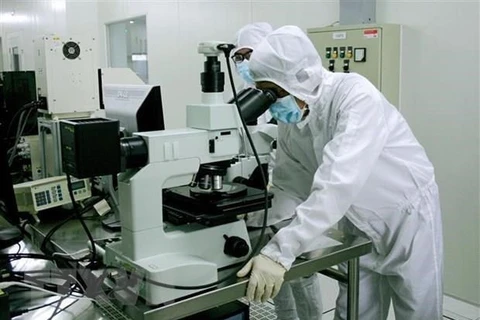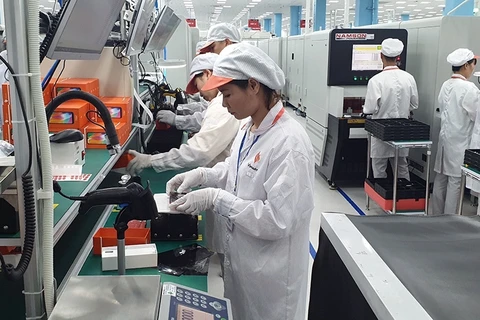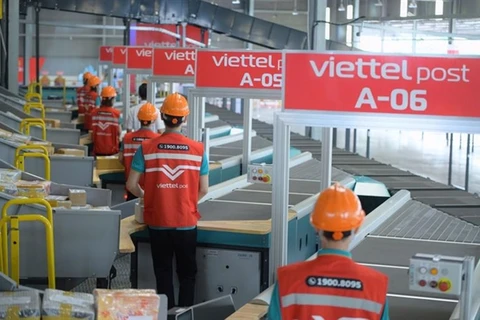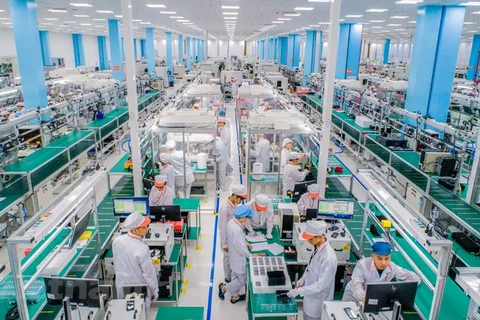 Science, technology and innovation play an important role in developing spearhead industries focusing on processing and manufacturing. (Photo: VNA)
Science, technology and innovation play an important role in developing spearhead industries focusing on processing and manufacturing. (Photo: VNA) Hanoi (VNA) - Deputy Prime Minister Vu Duc Dam has signed Decision No. 569/QĐ-TTg dated May 11 issuing a strategy for scientific-technological development and Innovation until 2030.
Part 2: III. KEY ORIENTATIONS FOR SCIENCE, TECHNOLOGY AND INNOVATION DEVELOPMENT
1. Orientations for focal tasks in the development of science, technology and innovation
a) Science, technology and innovation focus on serving sustainable and inclusive socio-economic development, and national defence and security safeguarding.
Promoting the restructuring of the economy in a way that increases the proportion of the value of hi-tech industrial products, helps sectors gain high productivity and added value by applying advanced and modern technology in tandem with promoting digital transformation in all sectors; promoting the development of processing and manufacturing industries and some spearhead industries and sectors basing on the technological foundation of the Fourth Industrial Revolution; gradually reducing the proportion of industries that have low labour productivity and added value and use outdated technologies.
Acquiring, mastering, transferring and widely applying advanced technologies in the world to improve labour productivity, product and service quality, and competitiveness of enterprises; proactively build solutions and technologies of Vietnam to develop green and circular economy, protect the environment, respond to challenges from disease outbreaks and climate change; researching and applying science and technology to the development of the defence industry in a dual-use and increasingly modern way, thus meeting the requirements of the Fatherland safeguarding in the new context.
Strengthening technological self-reliance and progressing towards the development of new technologies for Vietnam in some key sectors that the country boasts strength, potential and much room. Mastering core technologies, source technologies, and technologies of the Fourth Industrial Revolution in order to quickly absorb and apply them to the development of new products and services, key products and national brands, and carry out digital transformation in enterprises.
b) Reforming and completing the state management of science, technology and innovation
Perfecting the legal system on science, technology and innovation in conformity with the market mechanism and international practices; synchronising the legal regulations and policies related to science, technology and innovation in a way that removes bottlenecks and barriers, and creates the best possible conditions for the development of science, technology and innovation. Increasing breakthrough tools and policies in order to encourage and promote the application of new technology and innovation to improvement of enterprises’ competitiveness.
Improving the national innovation system, regional or sectoral innovation systems, high-tech parks, the innovation centre network, the innovative startup network, and intermediary and supporting organisations helping promote innovation.
Raising the capacity of the state governance over science, technology and innovation, especially the capacity to make and organise the implementation of policies on science, technology and innovation. Promoting and completing the mechanism for power decentralisation in the state management of science, technology and innovation in a way that ensures leanness, efficiency and effectiveness.
c) Developing the potential for science, technology and innovation
Arranging the system of public science and technology organisations in conformity with the priority orientations for science, technology and innovation, socio-economic development of the country, sectors and regions, and in a way that connects research with training.
Focusing on developing domestic human resources and attracting foreign and overseas Vietnamese experts who have high qualifications and creative capacity, in accordance with industrialisation requirements in the new context.
Continuing to effectively invest in and capitalise on hi-tech parks, hi-tech agricultural zones, concentrated information technology parks and laboratories in association with priority research areas; developing and improving the quality of the national science and technology information system towards digital transformation.
d) Promoting science, technology and innovation activities in enterprises and developing the science and technology market
Promoting the development of the science and technology market, gradually increasing the proportion of domestic technology and equipment supply, stepping up intermediary activities of the science and technology market, moving towards integration with commodity, labour and financial markets.
Focusing on promoting the transfer and application of advanced technologies, improving the technology absorption and innovation capacity, corporate governance, qualifications and skills of human resources; implementing digital transformation; reforming production process and business model of enterprises in conformity with the technological innovation process.
Increasing the quantity, quality and efficiency of the utilisation of intellectual assets, attaching importance to the development of enterprises’ intellectual assets and enhancing the protection and exercise of intellectual property rights. Promptly formulating national standards and basic standards for new technologies and products, exports and key products in order to meet the market’s requirements; ensuring that the development of intellectual assets and goods standards and quality is an effective tool for promoting innovation and the application of new technology.
 Science, technology and innovation make important contributions to building and developing Vietnamese cultural, social and human values. (Photo: VNA)
Science, technology and innovation make important contributions to building and developing Vietnamese cultural, social and human values. (Photo: VNA) 2. Orientations for the development of scientific research
a) Social sciences and humanities
- Researching and predicting development trends in the period to 2030 and the following decades, including trends of globalisation and international integration; trends of competition and conflict in the international context; the formation of new linkages in the world and the region; and sustainable development trend. Researching and predicting impacts of major global and regional trends on Vietnam’s development model, institution and security. Studying policies and solutions for Vietnam to seize opportunities and overcome challenges to develop, safeguard security and raise its stature.
- Continuing to review practices in the national renewal, construction and development to serve the formulation of guidelines, strategies and policies for national development and safeguarding in each period of time; conducting theoretical studies on development in the new context to provide grounds for the identification of a pathway to turn Vietnam into a developing country with modern industry and upper-middle income by 2030 and a high-income developed nation by 2045.
- Studying scientific and practical grounds for renovating the leadership method and improving the leadership capacity, ruling capacity and combat capacity of the Party; reforming state management and national governance, strongly promoting the people’s right to mastery, accelerating public administrative and judicial reforms, building and perfecting the rule-of-law socialist state of Vietnam in accordance to the new situation in each development stage of the country. Exploring ways to renew and improve the roles and responsibilities of organisations within the political system; reforming and strengthening the force of law and socialist legislation; ensuring human rights and citizens’ rights, and maintaining national defence and security.
- Exploring how to perfect the institution of socialist-oriented, full market economy in the new context; properly defining and bringing into full play the roles of all economic sectors, particularly the private one, to create a new engine of growth; forecasting and putting forth recommendations to improve the country’s resilience against internal and external challenges and risks, ensure macro-economic stability, and rapidly, effectively and sustainably develop the country, regions and localities.
- Identifying conditions, solutions and a roadmap for renovating and transforming the economic development model based on science, technology, innovation and digital economy to improve productivity, quality, effectiveness and competitiveness of goods and services as well as the economy as a whole.
- Studying characteristics, structure and development trends of the Vietnamese society in the light of the Fourth Industrial Revolution, international integration and non-traditional security threats; renewing ways of social management in the era of digital transformation; identifying conditions, measures and a roadmap for building a developed Vietnamese society with prosperous people, strong, democratic and civilized country by 2045, as well as a roadmap and specific steps for the next decade.
- Studying the formation, movement and development of cultures, ethnic groups and religions in Vietnam and impacts of new trends in the context of international integration; developing an innovative culture, digital culture and cultural industry serving national growth; building the national great unity bloc and an advanced culture imbued with national identity and embracing the mankind’s cultural quintessence; paying attention to ethnic minority communities, ethnic minority inhabited regions, mountainous areas, vulnerable groups, and regions with extremely difficult natural and socio-economic conditions to ensure the inclusive and harmonious development among residential communities.
- Studying orientations for education and training aimed at developing Vietnamese people in the new era as subjects of the society with comprehensive development, humanity and good cultural values, as well as expertise, skills, creativeness and innovative thinking, thus meeting increasingly high requirements of the country’s industrialisation and modernisation in the context of international integration.
- Studying green innovation policies, with focus placed on environmental, ecological and social aspects in line with the globalisation context.
b) Natural sciences
- Developing an advanced basic science keeping pace with global trends. Stepping up basic research and application-oriented basic research in the fields of Vietnam’s strength and demand to reach regional and global advanced levels, such as mathematics, physics, chemistry, life science, earth science and marine science.
- Studying scientific grounds for the rational use of natural resources; identifying the nature, causes and impacts of natural disasters, nature-human-society interactions and climate change in Vietnam in order to provide scientific evidence for the recommendation and implementation of measures to mitigate and respond to natural disasters, climate change and sea level rise.
- Promoting interdisciplinary studies of natural sciences, social sciences, humanities, and marine technology to provide scientific foundation for the planning, making and perfection of policies in developing, managing and exploiting marine resources, responding to climate change and promoting the sustainable development of marine economy; providing legal bases and historical evidence for defending national sovereignty over Vietnam’s seas and islands; conducting interdisciplinary studies of natural sciences, social sciences and humanities on biodiversity conservation for sustainable development.
- Focusing on application-oriented basic research to acquire and master core technologies and source technologies in order to rapidly, creatively, effectively and widely apply advanced technologies in production, services, business, daily life and social management for higher productivity, quality and competitiveness of enterprises, sectors and the economy as a whole, as well as for improved living standards and guaranteed national defence and security.
(to be continued)
























